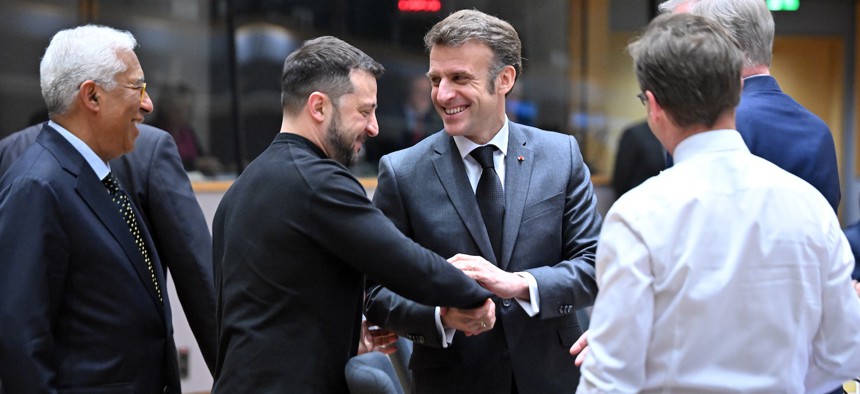
This commentary is published in coordination with the 2025 Global Security Forum, of which Defense One is a media partner.
Last month’s Signal chat scandal was the latest of several moves by the three-month-old Trump administration that have—at last—catalyzed European action toward strategic autonomy and defense capabilities. Now European leaders must keep their citizens on board.
At the EU and among member states, some of the most entrenched taboos around greater European autonomy seem to have dissipated in the past months. Centrists in Europe have seen their support increase after the unceremonious and mediatized collapse of existing norms around U.S. allyship.
French President Emmanuel Macron recently reiterated his willingness to extend France’s nuclear deterrence to other European nations. The new German chancellor, Friedrich Merz, has stated his interest in discussing such a proposal with France and the United Kingdom. Germany also approved a €1 trillion defense package, a dramatic shift away from the country’s sometimes-paralyzing post-war pacifism and resistance to militarization. Poland, one of the EU’s leaders in defense spending, has expressed its aim of gaining access to nuclear arms and to a larger military. Even laggards such as Belgium have sought to boost spending on critical military equipment.
The European Commission has proposed a plan to mobilize up to €800 billion for defense spending over four years. This includes €150 billion in loans for joint armament projects and activating a fiscal escape clause that permits member states to spend up to 1.5 percent of GDP on defense without breaching EU budget rules.
Critically, European capitals and the EU itself have framed the re-armament of Europe as intertwined with the defense of Ukraine. Critical and potentially fatal gaps will emerge for Ukrainian armed forces if Europe is unable to provide the advanced air defense systems, long-range strike capabilities, specialized munitions and satellite-based intelligence the U.S. has been supplying. And countries are moving towards a “coalition of the willing” to safeguard a future ceasefire deal—an effort that has brought the EU and the United Kingdom closer than they have been since Britain voted to leave the bloc in 2016.
Ukraine may even be a model for the future of a cost-effective European re-armament effort. The country has a rapidly growing advanced and competitive military industrial base, largely bankrolled through the so-called “Danish model.” Its more entrepreneurial nascent defense industry thus offers Europe a strategic opportunity: a cohesive defense ecosystem combining Ukraine’s cost-effective production and Europe’s funding, partially allowing for rapid European re-armament.
Still, there is reason for skepticism about whether Europe can efficiently implement and maintain its rapid re-armament and rebuilding of its defense industry. Pain points include stunted joint procurement efforts, lack of interoperability, differing strategic cultures, fragmentation of the defense industry—and even pushback from U.S. officials who say Europe must arm itself without buying fewer U.S. weapons.
Some analysts are forecasting a backlash to increased defense spending, tied to demographic crisis and corollary economic woes. The number of people over 65 has surpassed those under age 15, intensifying the pressure on the welfare state, particularly in areas like pensions and healthcare. Many European countries already have high debt-to-GDP ratios, meaning that increases in defense funding require difficult guns-vs-butter decisions.
As European leaders move to rapidly increase their defense capabilities in the longer term, many will seek to expand defense partnerships in the present, even with complicated allies. Perhaps the most obvious example is Türkiye, who has emerged as a key potential partner with considerable leverage over European leaders. Türkiye’s membership in NATO, including the alliance’s second-largest military after the United States, and its robust arms industry renders the country a relatively ideal alternative. Türkiye was also included in a list of non-EU countries who could potentially benefit from the European Commission’s new €150 billion rearmament fund.
But Türkiye also shows how the prioritization of defense may supersede Europe’s foreign-policy ideals. Turkish President Erdogan’s recent crackdown on his political opposition drew few of the condemnations that have previously met the country’s slide into authoritarianism. This tradeoff has its precedent in Tunisia, to which the EU has sent millions of euros to reduce migration despite the documented human rights abuses by Tunisian security forces.
The urgency of the moment may increase the difficult choices in Brussels and other European capitals, and, as the Tunisia example exemplifies, could be costly. The revelations of abuse of migrants in Tunisia led to an outcry in Europe, and the EU now must reconfigure its partnership with Tunis while being unable to reacquire the funds it has already dispatched. Leaders who a rush for U.S. defense alternatives may need to turn a blind eye to human rights concerns and democratic principles, and could see consequences with the electorate. Moreover, U.S. alternatives are far from an exact one-for-one exchange; new partners, such as Türkiye, do not provide the same high-tech defense and intelligence capabilities as the US—not to mention the shared history, including joint missions, democratic values, and allyship in the post-World War II era.
Defense spending at the expense of social welfare programs could affect the European political landscape. Populist politicians and figures across the ideological spectrum have described an alleged disconnect between Brussels’ priorities and those of the European electorate, mobilizing tens of thousands in Europe for protests over the cost of living, particularly energy prices. Centrists’ bump in support may not outlast the next elections.
To weather these effects, European leaders must develop messaging for the defense investment beyond esoteric values, which, at times, can be difficult to connect to the daily lives and needs of citizens. European leaders should remain clear-eyed and pragmatic in their search for alternative alliances, recognizing the need for supplementation while developing their own capabilities.
Michaela Millender is a Research Analyst at The Soufan Center.
Clara Broekaert is a Research Fellow at The Soufan Center and a Multi-Mission Analyst at The Soufan Group.
The post Europe is realigning—but can leaders keep citizens on board? appeared first on Defense One.




